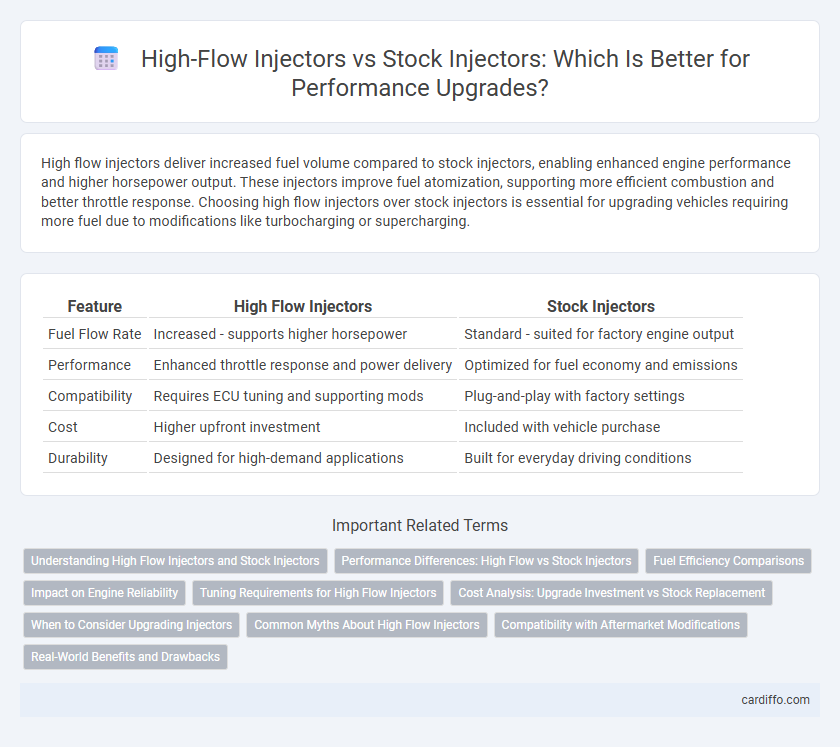High flow injectors deliver increased fuel volume compared to stock injectors, enabling enhanced engine performance and higher horsepower output. These injectors improve fuel atomization, supporting more efficient combustion and better throttle response. Choosing high flow injectors over stock injectors is essential for upgrading vehicles requiring more fuel due to modifications like turbocharging or supercharging.
Table of Comparison
| Feature | High Flow Injectors | Stock Injectors |
|---|---|---|
| Fuel Flow Rate | Increased - supports higher horsepower | Standard - suited for factory engine output |
| Performance | Enhanced throttle response and power delivery | Optimized for fuel economy and emissions |
| Compatibility | Requires ECU tuning and supporting mods | Plug-and-play with factory settings |
| Cost | Higher upfront investment | Included with vehicle purchase |
| Durability | Designed for high-demand applications | Built for everyday driving conditions |
Understanding High Flow Injectors and Stock Injectors
High flow injectors deliver increased fuel volume compared to stock injectors, allowing for enhanced engine performance and higher horsepower output. Stock injectors are designed to meet factory specifications, providing consistent fuel flow suitable for standard vehicle operation and fuel efficiency. Understanding the differences in flow rates, spray patterns, and compatibility with your engine management system is critical when upgrading to high flow injectors for optimized tuning and performance gains.
Performance Differences: High Flow vs Stock Injectors
High flow injectors deliver a greater volume of fuel compared to stock injectors, enabling improved horsepower and torque in high-performance engines. These injectors support increased air intake during upgrades such as turbocharging or supercharging, maintaining optimal air-fuel ratios for maximum combustion efficiency. Stock injectors, designed for factory settings, often limit performance gains due to their lower flow rates and reduced adaptability under increased engine demands.
Fuel Efficiency Comparisons
High flow injectors deliver a greater volume of fuel per cycle compared to stock injectors, allowing for increased engine power but often reducing fuel efficiency due to richer air-fuel mixtures. Stock injectors maintain manufacturer-specified fuel delivery rates optimized for balanced fuel economy and emissions compliance under standard driving conditions. Upgrading to high flow injectors requires recalibrating the engine management system to avoid excessive fuel consumption and maintain optimal fuel efficiency.
Impact on Engine Reliability
High flow injectors deliver increased fuel volume to support higher performance demands, potentially causing richer air-fuel mixtures that can reduce engine knocking and improve power output. However, improper tuning with high flow injectors may lead to fuel starvation or overheating, increasing engine wear and diminishing reliability. Stock injectors are calibrated for optimal fuel delivery under normal conditions, maintaining consistent engine performance and minimizing the risk of mechanical failures.
Tuning Requirements for High Flow Injectors
High flow injectors require precise tuning adjustments to accommodate increased fuel flow and maintain optimal air-fuel ratios, preventing engine damage and improving performance. Stock injectors typically operate within factory parameters and need standard ECU mapping, whereas high flow injectors demand custom fuel maps to ensure proper injector pulse width and avoid lean or rich conditions. Effective tuning involves using advanced software and wideband oxygen sensors to calibrate fuel delivery accurately for the enhanced injector capacity.
Cost Analysis: Upgrade Investment vs Stock Replacement
High flow injectors typically cost between $400 and $800 per set, representing a substantial upfront investment compared to stock injectors, which generally range from $100 to $250. While high flow injectors improve engine performance and fuel efficiency, the cost difference often justifies the upgrade for enthusiasts seeking increased horsepower and torque. Stock injector replacements remain a budget-friendly option for maintaining baseline engine functionality without the enhanced output.
When to Consider Upgrading Injectors
Upgrading to high flow injectors becomes essential when your engine modifications, such as increased boost pressure or larger displacement, demand more fuel delivery than stock injectors can provide. Stock injectors typically handle fueling requirements up to a certain horsepower threshold, beyond which they may cause lean conditions that risk engine damage. Monitoring fuel trims and power output helps determine the precise point at which high flow injectors will optimize performance and ensure safe, efficient combustion.
Common Myths About High Flow Injectors
High flow injectors do not inherently cause engine damage or poor fuel economy; these are common misconceptions. They provide increased fuel delivery for performance upgrades but require proper tuning to maintain optimal air-fuel ratios and engine health. Stock injectors are insufficient for high-performance applications, making high flow injectors essential for maximizing power gains without compromising reliability.
Compatibility with Aftermarket Modifications
High flow injectors provide increased fuel delivery to support performance upgrades such as turbochargers, superchargers, and larger throttle bodies, ensuring optimal air-fuel mixture for enhanced engine power. They are specifically designed to be compatible with various aftermarket modifications without causing lean conditions or engine knocking, unlike some stock injectors that may struggle with increased fuel demand. Proper calibration of the engine control unit (ECU) is essential to fully leverage high flow injectors and maintain reliability when upgrading vehicle components.
Real-World Benefits and Drawbacks
High flow injectors increase fuel delivery efficiency, enabling significant horsepower gains and improved engine performance, especially in turbocharged or heavily modified engines. Stock injectors often limit fueling capacity, causing lean conditions under high load and reducing reliability in performance applications. However, high flow injectors may require ECU recalibration and can lead to increased fuel consumption if not properly managed, while stock injectors typically offer better drivability and fuel economy in daily use.
High flow injectors vs stock injectors Infographic

 cardiffo.com
cardiffo.com